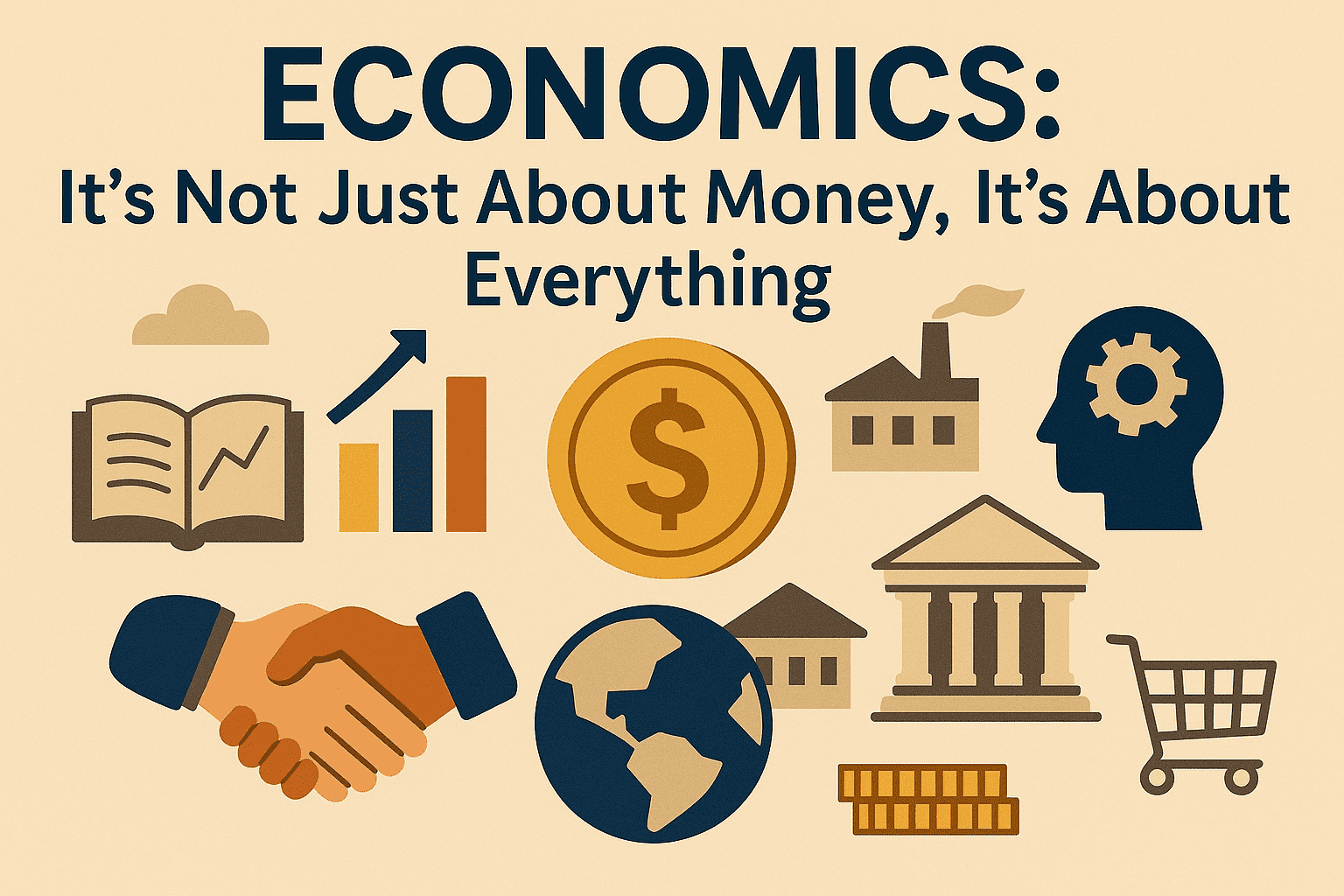Basically, economics is the segment of social sciences that analyses how societies figure out regarding the use of meager resources, either in the form of cash or kind, to meet their genuinely endless desires and needs. It examines the choices made by individual persons, households, businesses, and governments at different tiers when confronted with the reality of scarce resources.
Economics is like to comprehend how we as a society opt who gets what when there is not enough to twist. It observes at how individuals, businesses, and even the government resolves when they cannot have all the things they want.
The study of economics broadly categorizes into two key areas as in micro economics and macro economics. The previous one analyses economic behavior of the individual person, household, and market, centering on the choices of individual consumers and producers while the latter one sees the entire picture like examining the whole economy and addressing issues like inflation, poverty, unemployment along with all-inclusive economic expansion.
The economics as a discipline leans on crucial concepts like demand and supply, which determine price and quantity equilibrium in markets; scarcity (not enough of resources to fulfill everyone’s wants and requirements entirely), opportunity cost (give up one thing for the sake of having another one) and incentives, which outline economic behavior. A comprehensive knowledge of these principles is crucial for examining economic mechanisms and making thoughtful decisions.
Why is economics considered so vital?
Economics is crucial because it tenders a framework for comprehending the worldwide systems of producing, distributing, and consuming commodities and services. It gives the essential tools for individuals, firms, and governments to make knowledgeable decisions when resources are scarce.
The basic propositions of economics come up with a framework for more desirable decision-making in our individual lives, educating how we administer our finances, aware of market dynamics, and tackle our expenses, saving, and investment. In the corporate world, this same economic lens is crucial for thoughtful choices in terms of pricing, production capacity, and strategies for flourishing in cutthroat competitive markets.
Economically fact-based decisions at a societal level are basic to frame effective government policy. This conviction permits governments to address significant issues like unemployment, poverty and income inequality, inflation, infrastructure deficit and the drive for economic upswing. By comprehending key economic concepts, policymakers can generate mediation framed to enhance public welfare, boost productivity, and enrich development that can be sustained eventually. Intrinsically, economics provides the understanding essential for creating a more flourishing and safe world for everyone.
What makes economics a distinct and crucial discipline?
Due to its distinctive examination of how societies cope with inadequate resources to meet unlimited wants, economics serves as a critical social science, dissimilar to political science, history, sociology, geography, and psychology. This particular revolve around scarcity and decision-making, subject to restraints, yields a basic level of analysis appropriate to comprehend a broad realm of social phenomenon.
With its compelling analytical tools and models, comprising demand and supply, cost-benefit analysis and game theory, economics provides a multifaceted framework for acknowledging diverse social practices, varying individual choices to the workings of institutions. This permits economic propositions to enlighten areas like voting patterns, the evolution of social norms, and individual favoritism in decision-making.
Economic forces also intensely shape social structures and historical routes. Understanding economic systems, inequity, and growth is essential for comprehending social grouping, political beliefs, and international affairs. Due to its subject matter – wealth, impoverishment, trade, and development – straightaway affects public welfare and societal advancement, economics bears fundamental relevance for the whole social sciences.
Where an economics degree can lead you?
Economics is not limited to academic study only but it is also a powerful framework that importantly governs career development in various fields. Its scope in this regard is immense and large because of enlarging global integration and the significance of data.
Primarily, an economics background evolves concrete analytical and problem-solving expertise. The ability to think critically, assess data and model complex systems is greatly valued, making economics graduates longed for financial analysts, market researchers, data scientists, and management consultants.
Further, economics lays a solid preliminary work for careers in finance like banking, investment, and insurance. Understanding macroeconomic indicators, financial markets, and risk management is crucial for roles such as economists, financial advisors, investment bankers, and statisticians. Also, economics is significant for government policy and good governance. Economics graduates can share in moulding the future in the form of policy mentors, economic analysts, and researchers in government departments, world organizations, and think tanks, where they look over policy outcomes and suggest solutions to socio-economic hardship. Additionally, economic doctrines are progressively pertinent to technology, medical management, and environmental sustainability.
Economics plays a crucial role in procuring government jobs by furnishing a strong foundation for understanding and analyzing government policies and economic challenges:
- Economic Planning and Analysis in NITI Aayog
- Financial Management
- Policy Formulation
- Regulatory Bodies like SEBI, NSE, BSE
- Statistical Services like data collection, presentation, analysis, and interpretation
Competitive examinations are a viable choice for economics graduates:
Union Public Service Commission (UPSC; IAS, IFS, IRS, IAFS), Indian Economic Service (IES)/Indian Statistical Service (ISS), Provincial Civil Services (PCS; SDO/SDM, B.D.O.,), and SSC CGL at both Centre and State levels, RBI, NABARD, RRB, Cooperative Banks, ONGC, BHEL, NTPC, Railways, Banking (other nationalized and private banks), states’ Sub-Inspector (SI) and police constable exams. A strong knowledge of economic concepts can essentially enhance an aspirant’s performance in these examinations.
To summarize, an economics degree gives opportunities to an adoptable and powerful amalgamation of skills and knowledge, open the way for a mixed span of impactful and rewarding job careers. It makes able to economics graduates to comprehend complicated issues, provide rational and sensible choices, and contribute appreciably to both economic and societal progress and ennoblement. In India, economics graduates (UG/PG) are in a privileged position to escalate effective and stable government job careers. Their exclusive expertise knowledge strokes up national economic progress and shapes pivotal policy decisions across various government functions and public duties. With wholeheartedness and strategic planning and preparation for diverse government competitive exams, they can get possession of fulfilling roles where their economic perspicacity explicitly contributes to the India’s prosperity. As governments progressively have every confidence in data-driven economic plan of action, the demand for their proficiency and competence are set to heighten.
– Dr. Moharram Ansari
Assistant Professor, Department of Economics, Faculty of Humanities and Social Sciences, Madhav University

